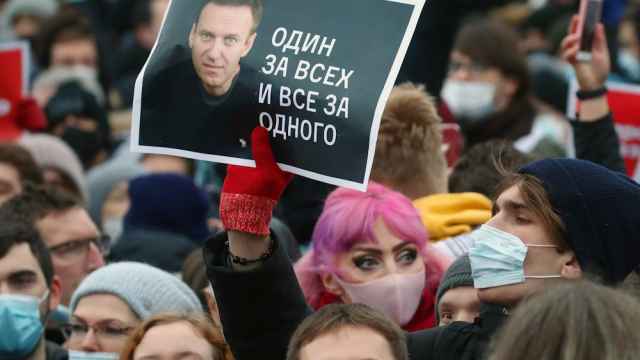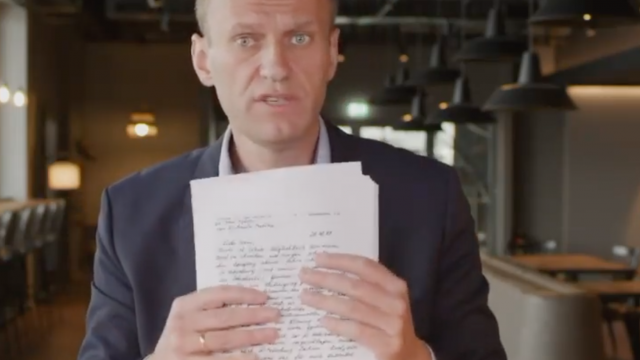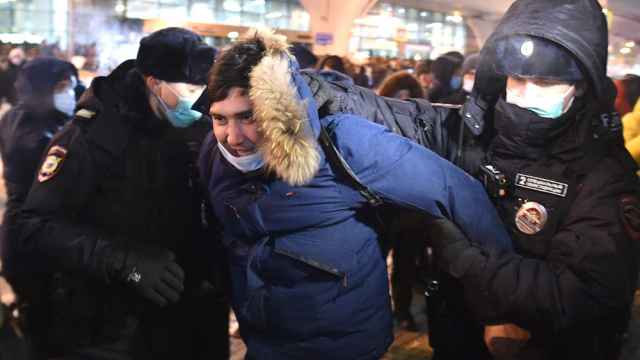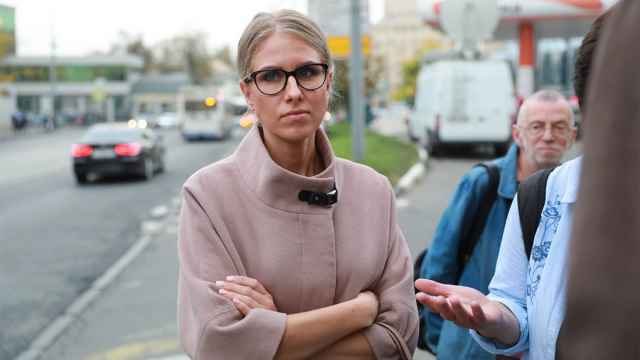Tens of thousand supporters of opposition leader Alexei Navalny rallied across Russia Wednesday to demand the release of the jailed activist, who has been on hunger strike for three weeks.
Allies of the anti-corruption campaigner — who returned to Russia in January after recuperating from an alleged poisoning attempt last August — called the action for the day of President Vladimir Putin’s state-of-the-union address.
With Navalny’s organizations set to be labeled “extremist” and effectively banned, his aides had billed the protests as a final battle in what they have dubbed a struggle against "absolute evil."
“I am here to support my fellow citizens and also of course Navalny,” said 22 year-old Anna Zhurovskaya, a student at a leading Moscow university.
“I am angry about how he has been treated. I think it’s important to be here today, to show solidarity and be on the streets with like-minded Russians.”
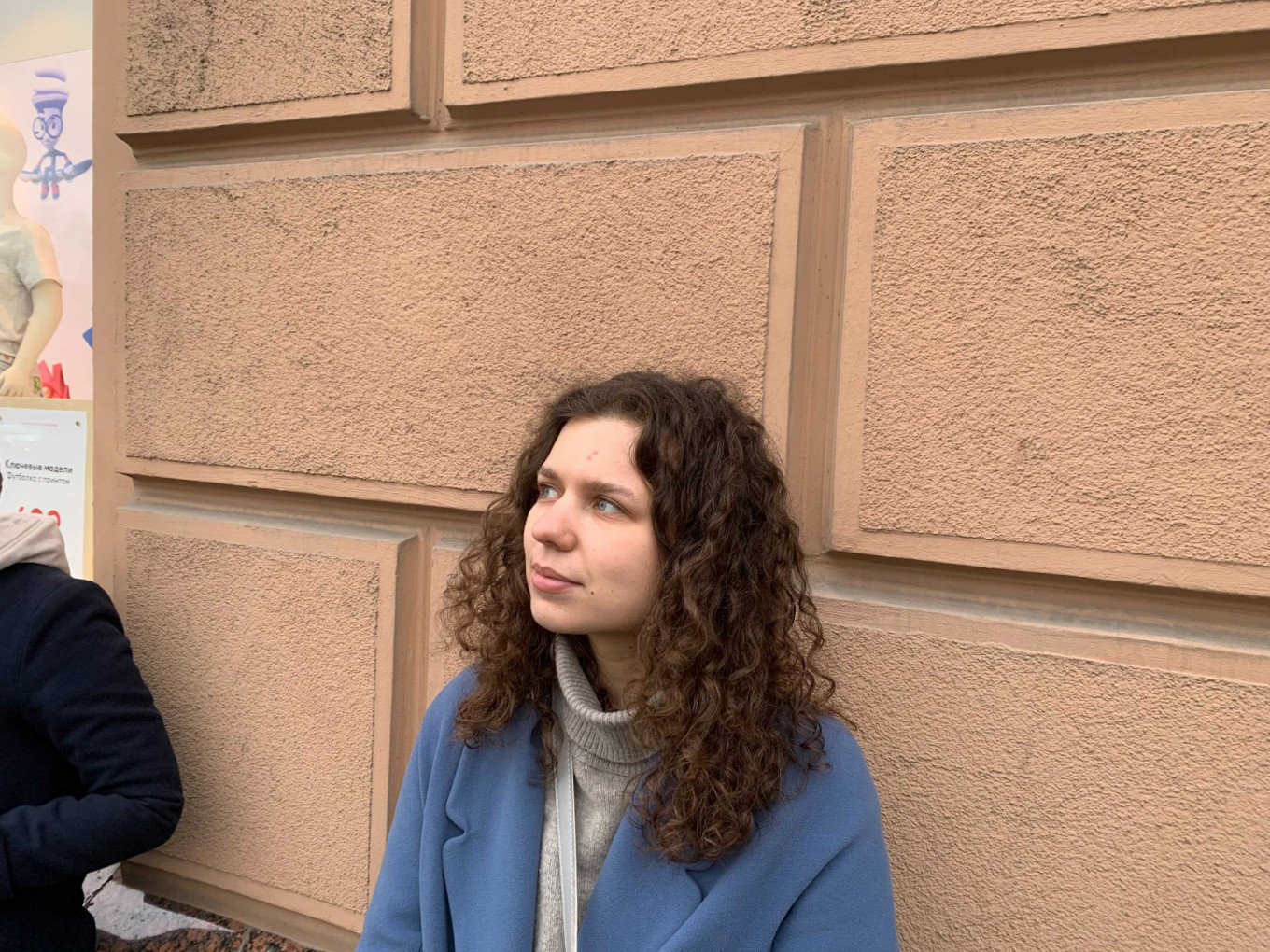
Police said that 6,000 people had showed up around Moscow’s Manezhnaya Square, near the building where Putin had spoken hours earlier without mentioning Navalny. They said that 4,500 had gathered in Russia’s second city St. Petersburg, and 14,000 nationwide.
Independent observers and local media said the figures were substantially higher.
"I've seen the worst of the Soviet Union, I've seen the worst of the 1990s. But what is happening now is even worse. We are back in 1937 again. It has to stop," said Valentina, 82, a protester on Nevsky Prospekt in St. Petersburg.
In Moscow, a few steps from Red Square the pro-Navalny crowd chanted “Putin is a thief” and “set him free,” while cars driving along Moscow’s main Tverskaya Street honked their horns in solidarity, according to a Moscow Times reporter at the scene.
In the hours before the protest, police in riot gear fanned out across central Moscow. Though the wholesale police violence meted out to protestors in January was absent, the OVD-Info independent monitor said 1,496 people had been detained in 64 cities across Russia throughout the course of the day, including 26 in Moscow.
The Navalny team had invited would-be protestors to sign up on its website, publicizing the number of attendees in hundreds of towns and cities across Russia.
Though they had initially intended to wait for 500,000 registrations before calling for demonstrations, Wednesday’s protest was announced with only 460,000 sign-ups, after Navalny’s doctors said his health situation had become critical.
Actual turnout was much smaller, with major Siberian cities including Novosibirsk and Irkutsk seeing between 30 and 40% of registrants attending protests.
In smaller towns, protestors were fewer still. In Far Eastern Petropavlovsk-Kamchatsky, local media reported only around forty demonstrators, of around 700 who had signalled they would attend.
In his speech earlier in the day, Putin stayed true to form and didn’t mention Navalny, who he has never referred to by name. Instead, he outlined a host of new spending pledges and schemes to give struggling Russian families a little extra cash in the run-up to parliamentary elections scheduled later this year.
Despite Russian living standards falling to their lowest level in a decade, Putin’s approval rating, which stands at 63%, has remained stable over 2021. While Navalny recently managed to gather significant attention in Russia with a viral video investigation into Putin’s alleged palace on the Black Sea, a recent survey from the independent Levada pollster showed that only 20% of Russians said they approved of his activities.
Only 29% of Russians believe Navalny’s prison sentence was unfair, according to another Levada poll.
“The government tries to control us through intimidation and fear. That is why not more people are out today” said Igor Bezvekhov, 25, project manager at a creative firm.
“The same people have been in charge for over 20 years, practically my whole life. If I don’t go out now, then nothing will change,” Bezvekhov said.
The rallies took on additional significance amid an escalating legal crackdown on the Navalny movement that could see the opposition leader’s organizations effectively criminalized, and his supporters subject to tough legal penalties.
Last week, Moscow prosecutors asked a court to brand Navalny’s Anti-Corruption Fund and his regional headquarters network “extremist organizations,” a label that would ban them from operating within Russia and could lead to prison time for staff and supporters. The Moscow City Court will review the request in a closed hearing on April 26.
“This is the last chance to сonvene a rally before the recognition of Navalny's structures as extremist organizations,” said Andrey Kolesnikov, senior scholar at the Carnegie Moscow Center think tank.
“The Kremlin has decided to solve the Navalny problem once and for all.”
For Navalny’s top aides, most of whom have now left Russia to avoid criminal prosecution, the protests represented the end of an era for a movement that has been taking to the streets for the best part of a decade.
“We’ll figure out how to adapt our work to this new reality,” Ruslan Shaveddinov, a press secretary for the Anti-Corruption Fund who is now based in Lithuania, said of the crackdown.
“We’re not going to go underground.”
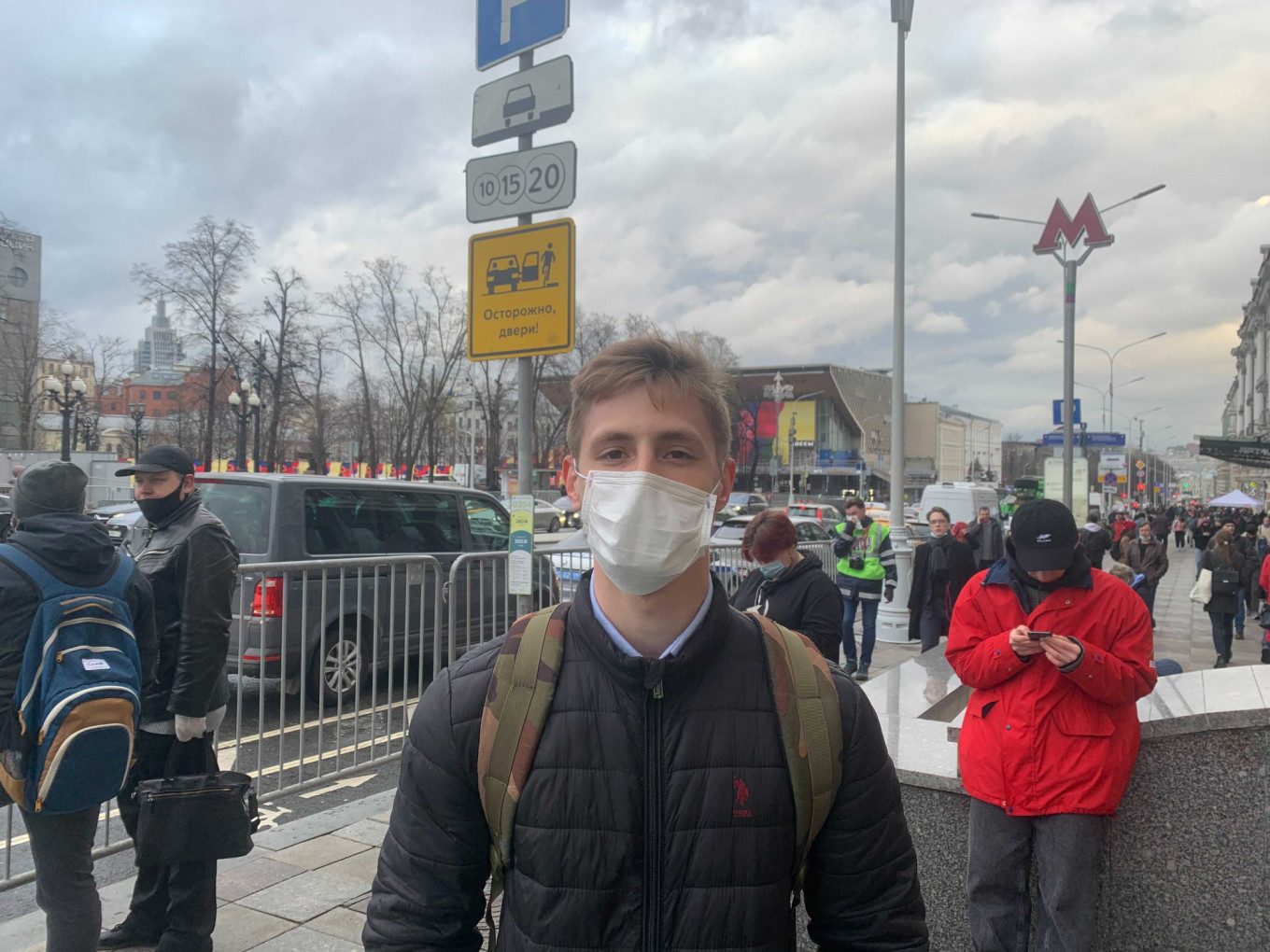
For Navalny’s allies in Russia, the protests presented something of a dilemma.
With many having been arrested and convicted for participation in January’s protests against the opposition leader’s initial detention — in which over 10,000 people were arrested with 50 currently facing trial — fresh protests carried the prospect of criminal prosecution and up to six years in prison.
In the Siberian city of Tomsk — a Navalny stronghold and the site of the opposition leader’s poisoning last summer — local lawmaker and Navalny headquarters chief Ksenia Fadeeva announced that she would refrain from protesting for the first time in ten years, citing the prospect of criminal charges stemming from her previous convictions.
In the hours after Tomsk’s protest concluded, Fadeeva was arrested anyway.
For many protestors, the escalating crackdown makes little difference, with protest heavily criminalized even now.
“It’s already scary to go out and protest,” said Bezvekhov.
“But if we don’t go out now, then our future will be worse.”
Despite a darkening outlook, analysts remain skeptical that the Navalny movement, which has dominated Russian opposition politics for almost a decade, will be completely destroyed in the coming months.
“The Kremlin can’t totally destroy Navalny’s movement, or erase the support for him among a section of the population” said Tatiana Stanovaya, founder of the R.Politik political consultancy firm.
“They will continue to work on investigations and on Smart Voting from abroad,” she said, referring to a tactical voting campaign that aims to stop ruling United Russia party members from being elected.
Notwithstanding the crackdown, for some older veterans of Russia’s protest movement, the predominantly younger Navalny supporters who turned out gave cause for hope.
“I really admire the young people here,” said Timur Bespalatov, a 67 year-old pensioner who said he had been a regular protest-goer since the Perestroika era.
“It’s their future that’s at stake here.”
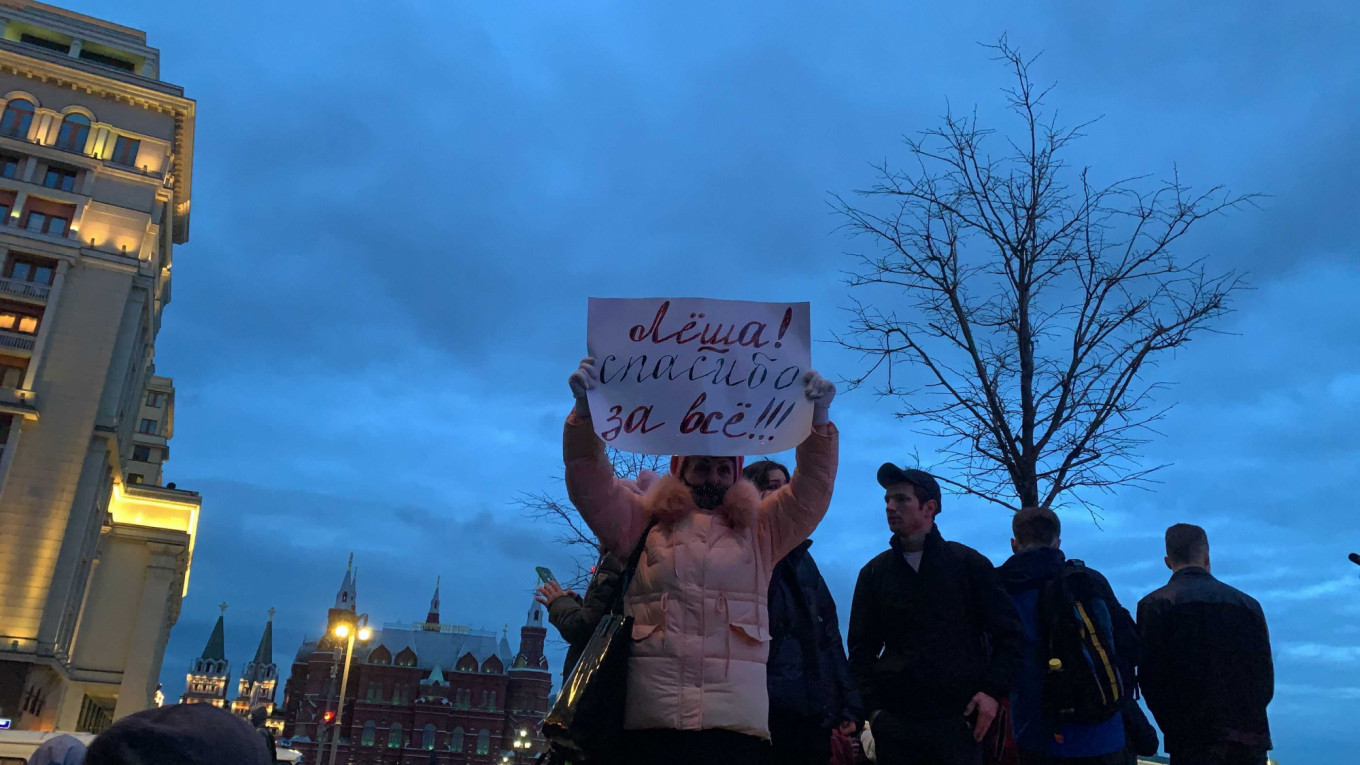
With reporting by Ksenia Elzes in St. Petersburg.
A Message from The Moscow Times:
Dear readers,
We are facing unprecedented challenges. Russia's Prosecutor General's Office has designated The Moscow Times as an "undesirable" organization, criminalizing our work and putting our staff at risk of prosecution. This follows our earlier unjust labeling as a "foreign agent."
These actions are direct attempts to silence independent journalism in Russia. The authorities claim our work "discredits the decisions of the Russian leadership." We see things differently: we strive to provide accurate, unbiased reporting on Russia.
We, the journalists of The Moscow Times, refuse to be silenced. But to continue our work, we need your help.
Your support, no matter how small, makes a world of difference. If you can, please support us monthly starting from just $2. It's quick to set up, and every contribution makes a significant impact.
By supporting The Moscow Times, you're defending open, independent journalism in the face of repression. Thank you for standing with us.
Remind me later.





